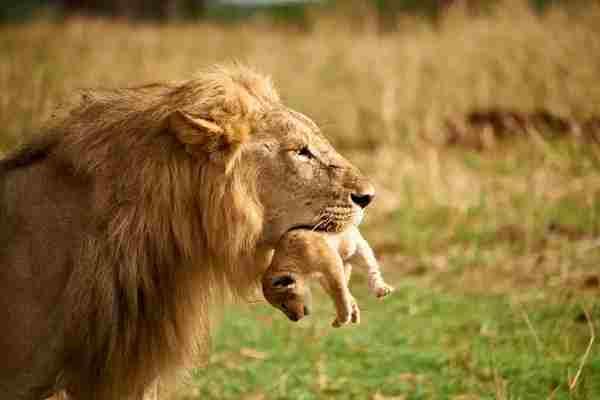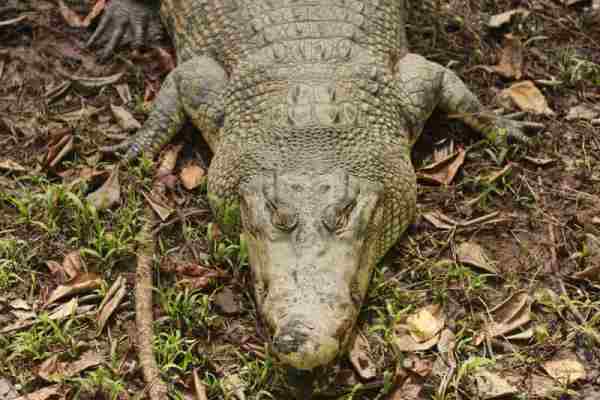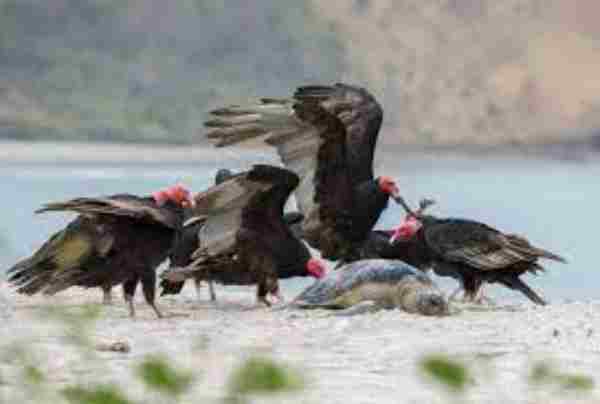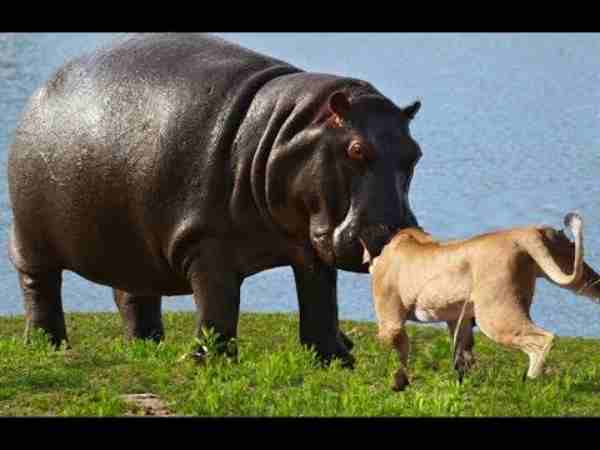The king of the jungle reigns supreme in the animal kingdom. Lions are known to be fierce hunters with incredible strength that can easily take down their prey. Their dominance has earned them respect and fear from other animals. However, no matter how fearless they may seem, lions are not invincible.
Table of Contents
Despite being apex predators, they can still fall victim and become prey to other animals. This fact may come as a surprise to some, but in the natural world, even the hunters can become hunted. So, if you have ever wondered about the animals that eat lions, you have found the right place to quench that curiosity.

What Eats Lions?
Lions have always been known as the kings of the jungle. They are apex predators, which means they are at the top of their food chain and are not typically preyed upon by other animals. However, there are some rare instances where other animals may kill and eat lions. Hyenas, crocodiles, leopards, and wild dogs have all been known to attack lions, but it’s important to note that they don’t do it for dietary purposes.
Instead, these conflicts usually arise due to competition over resources like food and territory. It’s fascinating to think about the complex interactions between these top predators and how they navigate their relationships with each other in the wild.
Hyenas

The African wilderness is a place where the survival of the fittest is the norm, and two of its fiercest predators, hyenas and lions, reign supreme. These two animals have a timeless rivalry that plays out on multiple fronts, but at its core is the competition for food.
Both hyenas and lions are skilled hunters, but they also aren’t above resorting to theft when the opportunity presents itself. In addition to their shared love of hunting, both of these animals are highly territorial and fiercely protective of what is theirs.
While it’s true that lions are usually the more dominant predator due to their size and strength, hyenas are cunning and can be just as intimidating to their larger neighbours. It’s a rivalry unlike any other and one that has stood the test of time in the unforgiving African wilderness.
Crocodiles

At the top of the food chain, giant reptiles like crocodiles reign supreme, with only a select few animals daring to challenge them. Unlike their land-dwelling counterparts, crocodiles don’t typically have issues with territorial disputes with lions, mainly because they prefer spending most of their lives submerged in water.
Despite being equally strong and imposing creatures, crocodiles and lions tend to respect each other’s power and avoid confrontations if possible.
However, crocodiles are known to be opportunistic predators, capable of attacking almost anything that comes too close to the water’s edge- even if that means taking on a lion. It’s not unheard of for lions to venture into crocodile-filled rivers to quench their thirst or cool off, but the risks they take may be fatal in some cases.
Leopards

Even the king of the jungle has his share of enemies in the wild. Among them are the leopards, relatives of the lions. While leopards are proficient hunters, they barely take on adult lions. The reason is simple – adult lions are simply too big and strong for them. However, when it comes to lion cubs, the story is different.
When left unprotected, leopards won’t hesitate to attack and take advantage of the situation. Cunning and strategic, leopards recognize the vulnerability of unguarded lion cubs and will not miss the opportunity to strike. It’s a ruthless world out there, even for the mighty lions.
African Wild Dogs

When lions and African wild dogs cross paths, it’s not always a fair fight. Despite their intelligence and agility, wild dogs are smart enough not to pick fights they can’t win. They skulk away when male lions are around, and only go after lone lionesses when they have enough of their pack members to take them down.
Unfortunately, they share with other lion enemies the tendency to go after lion cubs whenever possible. This is why only about 12% of lion cubs are able to survive into adulthood. But lions are not known for their mercy to other predators young either. They will kill the offspring of their enemies purely as a display of dominance, reinforcing their powerful status in the African animal kingdom.
Humans

While humans generally abstain from consuming lions, we hold the dubious distinction of being the primary predators of these majestic felines, primarily due to widespread extermination. The lion population faces a grave peril as a result of poaching and trophy hunting, leading to their classification as a vulnerable species.
Over the past two centuries, the number of wild lions has plummeted by a staggering 60%, leaving a meagre population of approximately 20,000 lions in existence today. Astonishingly, just a century ago, Africa was home to over 200,000 of these magnificent creatures.
Regrettably, certain regions such as Botswana, South Africa, Zimbabwe, and Namibia continue to permit the hunting of wildlife, including lions, thereby exacerbating the crisis and contributing to their declining numbers.
As apex predators within ecosystems, lions play a vital role, and their potential disappearance would have profound implications for the entire system. Additionally, these splendid creatures possess cultural and symbolic significance worldwide, underscoring the collective responsibility to ensure their protection and well-being.
Vultures

Vultures may not be the first animals that come to mind when considering creatures that consume lions. Typically associated with death and decomposition rather than the intense battles of the wilderness, these scavengers are always on the prowl for a satisfying meal.
Although vultures do not typically engage in direct attacks on live animals, they remain vigilant for opportunities to feast. Whenever a lion perishes, whether due to natural causes or at the hands of another predator, its lifeless body transforms into a grand banquet for buzzards.
Equipped with exceptional eyesight and a potent sense of smell, these birds can detect a fresh kill from great distances.
Once a vulture discovers a lion carcass, it wastes no time tearing through the flesh. With their sharp beaks, they rip apart the meat, hastily devouring as much as they can before other scavengers make their appearance.
Furthermore, it’s not only vultures that find a lion’s remains enticing – other creatures such as hyenas may also attempt to seize a few morsels.
How Do Lions Protect Themselves?
Mature lions, reigning as the unrivalled monarchs of the animal realm, encounter limited threats from fellow predators. However, their esteemed status is not the sole defense mechanism they employ to safeguard themselves against danger.
Life in Pride
For lions, living in pride is more than just a social gathering or an opportunity for group bonding. It’s a built-in protection system that deters any potential predators. A pride consists of up to three males, a dozen females, and their cubs, forming a formidable pack that can quickly defend itself. Their sheer number and coordinated effort make them less likely targets than solitary lions.
Each member of the pride has a valuable role to play, with distinct responsibilities based on gender. The males, with their incredible strength, serve as protectors, fiercely guarding their territory and young. Meanwhile, the lionesses use their hunting skills to provide food for the group.
Size & Strength
When it comes to big cats, the lion is not one to be trifled with. As the second-largest of its kind, its size and strength are truly formidable. Males can tower up to eight feet tall and weigh well over 200 kilograms. Even the females of the species pack a punch, with all the power a predator could ask for.
Sharp teeth and rippling muscles are just a few of the many attributes that make them the kings and queens of their domain. Thanks to their impressive speed and agility, any foe would be wise to think twice before starting a fight with a lion. It’s just one of the many reasons why this big cat is such an icon in the animal world.
The Roar
In addition to serving as a means of communication among themselves, the roar of a lion functions as a potent warning to potential intruders. This sonic weapon possesses a terrifying quality that often deters would-be attackers, effectively establishing their dominance and safeguarding their territory.
Remarkably, a resounding roar can reach volumes of up to 114 decibels and traverse a distance of approximately 5 miles across the African savannah. To put this into perspective, the noise produced by a jet plane during takeoff measures around 120 decibels.
No creature on Earth remains unaffected by these colossal warning roars.
While lions, as the mighty and formidable rulers of the animal kingdom, may not experience fear in the same manner as humans, there are certain large mammals that they tend to avoid. This avoidance stems not from fear but rather from the potential for injuries inflicted by these animals.
Some of these formidable creatures include:
- Elephants
- Hippos
- Rhinos
- Giraffes
Additionally, in regions where lions come into contact with humans, particularly those armed with guns and other weapons, they may learn to associate humans with danger and exhibit increased caution in their presence.
FAQs
What animal kills a lion?
These massive creatures can weigh up to 2,000 pounds and have been known to gore lions with their sharp horns. In fact, it’s been reported that buffalo have killed more lions in Africa than any other species. The ferocity of these animals should not be underestimated and serves as a reminder that in the animal kingdom, size and strength do not always guarantee victory.
Who eats the lion in the food chain?
Scavengers like hyenas and vultures are known for their ability to devour carcasses, and they will often be the ones to feast on a fallen lion. Even smaller creatures like insects and bacteria play a role in breaking down the lion’s remains and returning them to the earth.
What eats lions?
Hyenas, for example, are known for their opportunistic scavenging and may occasionally attack a sick or wounded lion. Large crocodiles found in Africa’s waterways are also known to target lions who venture too close to the water’s edge. In addition, young or weakened lions are often targeted by predators such as leopards, cheetahs, and even other lions.
Final Words
As one of the top contenders in the animal kingdom, lions are often seen as unstoppable forces that can effortlessly take down their prey. While it is generally true that lions do not have natural predators due to their powerful build, there are a few exceptions. Creatures such as hyenas, crocodiles, leopards, and wild dogs have been known to prey on lions, although these incidents are quite rare.
These attacks are typically a result of competition over resources, such as food and territory, rather than an attempt to acquire a meal. However, the most significant threat to the lion population is posed by humans. Poaching and trophy hunting have led to a sharp decline in the number of lions, making conservation efforts all the more urgent.
Reference:
- https://www.marylandzoo.org/animal/african-lion/
- https://lionalert.org/what-do-lions-eat/
- https://news.cgtn.com/news/2022-02-01/More-About-Tiger-Why-is-the-tiger-the-true-king-of-the-jungle–17iwKbWin1S/index.html
A motivated philosophy graduate and student of wildlife conservation with a deep interest in human-wildlife relationships, including wildlife communication, environmental education, and conservation anthropology. Offers strong interpersonal, research, writing, and creativity skills.










